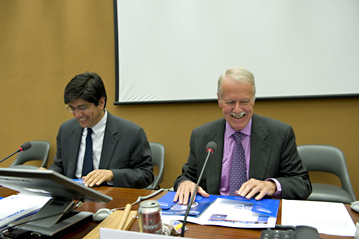Cameroon: New office opens to protect and care for Mbororo Central Africans
Cameroon: New office opens to protect and care for Mbororo Central Africans
UNHCR has just opened a new field office in the eastern Cameroon town of Bertoua, some 400 km east of the country's capital, Yaoundé. The need for a new and stronger field presence was triggered by the arrival of several successive waves of ethnic Mbororo refugees fleeing from the neighbouring Central African Republic in 2005-06. In total, an estimated 25,000 refugees arrived in Cameroon and are scattered along the country's border with the Central African Republic (CAR).
Mbororos are nomadic cattle breeders from west and north-west CAR. Those fleeing to Cameroon say they have been systematically and relentlessly targeted by organised groups of bandits and rebels who steal their cattle. Livestock are not only the Mbororo's primary possession, but also a sign of wealth in this part of Africa. Many Mbororo refugees also claim that their wives and children have been kidnapped and they had to pay high ransoms to get them back.
Most of Mbororos cross the border on foot, carrying their few remaining possessions. A small number of those who managed to save some of their livestock continue to graze cattle inside Cameroon. But the others, having lost everything, are in an extremely precarious situation.
The government of Cameroon, in line with its national refugee law adopted in July 2005 and the 1969 OAU Convention, has recognized this population as prima facie refugees. UNHCR took part in a number of joint assessment missions with the government and other UN agencies to Adamaoua province and other areas bordering CAR. According to their reports, most of the Mbororo refugees scattered across eastern Cameroon live in destitute conditions, with children often suffering from malnutrition and diseases.
UNHCR now has a five-member team in Bertoua, enabling us to carry out our refugee protection mandate and to provide necessary assistance. The immediate priorities are food, health care, water and sanitation projects. In 2007, we are seeking US$1.1 million to reinforce our protection monitoring and to extend our assistance programmes in eastern Cameroon. We are also planning to move the destitute refugee population from the insecure region around Ngaoui to Ngam, about 65 km from the border with the CAR. Instead of moving them to a camp, these refugees will be moved to rural areas where they can be more self-reliant.
In addition to the 25,000 Mbororo refugees from CAR, Cameroon presently hosts some 11,000 refugees and over 4,000 asylum seekers from various countries in Central and West Africa.







